5.05.2024
Virgin Galactic to launch 7th commercial spaceflight on June 8
The company has not yet identified the crewmembers of its Galactic 07 mission.
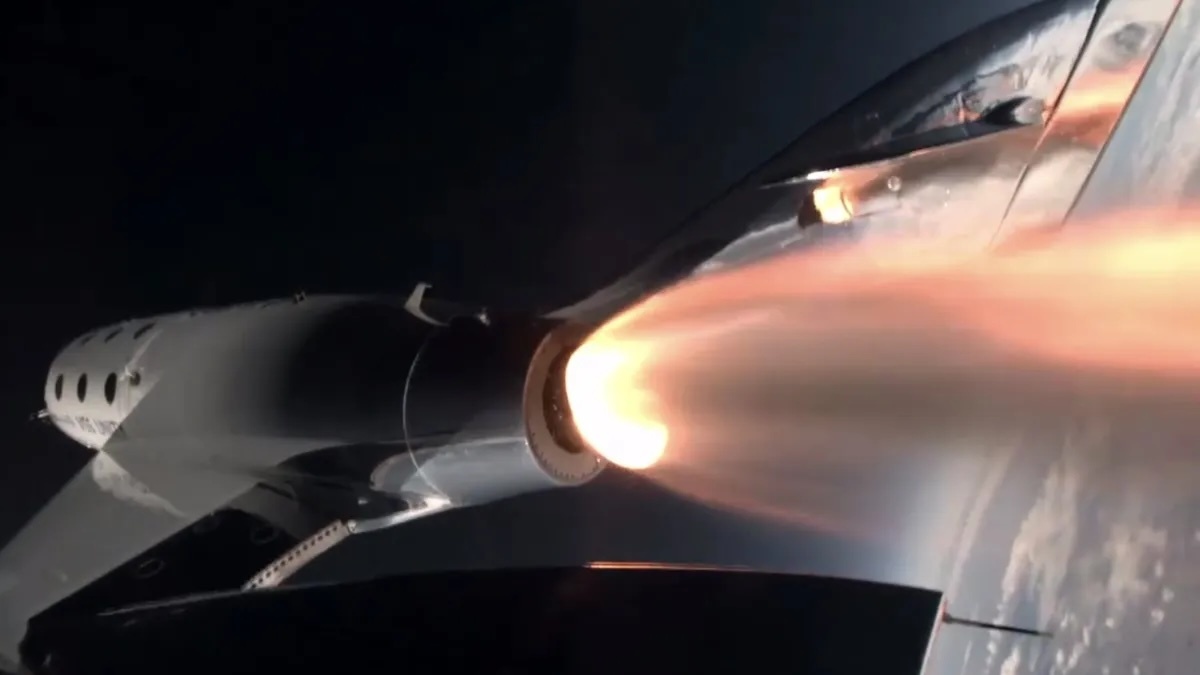
Virgin Galactic's VSS Unity space plane lights its rocket motor during the Galactic 06 suborbital mission, which launched on Jan. 26, 2024. (Image credit: Virgin Galactic)
Virgin Galactic will fly again next month, if all goes according to plan.
The company announced on Wednesday (May 1) that it's targeting June 8 for its seventh commercial spaceflight, a suborbital jaunt called, fittingly enough, Galactic 07.
It will be Virgin Galactic's second spaceflight of the year, after the Galactic 06mission on Jan. 26, and its 12th overall to date.
Virgin Galactic uses an air-launch system that consists of two vehicles: A carrier aircraft called VMS Eve and a suborbital spaceliner known as VSS Unity.
Eve lifts off from a runway with Unity beneath its wings, then drops the spacecraft at an altitude of about 45,000 feet (13,700 meters). Unity then fires up its onboard rocket motor, blasting its way to suborbital space.
Passengers aboard the space plane experience a few minutes of weightlessness and get to see Earth against the blackness of space. A ticket to ride on Unity currently sells for $450,000.
Galactic 07 will depart from Spaceport America in southwestern New Mexico, carrying four passengers in Unity's cabin. Virgin Galactic has not yet identified these people, but the company has given us a bit of information about them.
Three are private astronauts, one apiece from New York, California and Italy. The fourth is "an Axiom Space-affiliated researcher astronaut who will conduct multiple human-tended experiments," Virgin Galactic wrote Wednesday in a Galactic 07 mission update.
Axiom Space is a Houston-based company that has organized three crewed trips to the International Space Station to date, all of them using SpaceX hardware. Axiom also plans to assemble and operate its own space station in Earth orbit later in the 2020s.
During the Galactic 06 mission in January, an alignment pin that helps secure Unity to Eve detached unexpectedly from the carrier craft. This happened after Unity had separated and begun flying freely and did not endanger anyone involved in the flight, according to Virgin Galactic.
Nevertheless, the company conducted an investigation along with the U.S. Federal Aviation Administration (FAA). That work is now done, and steps have been taken to ensure the issue doesn't crop up on Galactic 07 or other future flights, according to Virgin Galactic.
"The FAA has accepted Virgin Galactic's final investigation report, as well as the corrective actions that have been made to enhance the retention mechanism of the pin and the addition of a secondary retention mechanism," the company wrote in Wednesday's update.
Quelle: SC
----
Update: 9.06.2024
.
One last time: VSS Unity plans final launch for this weekend
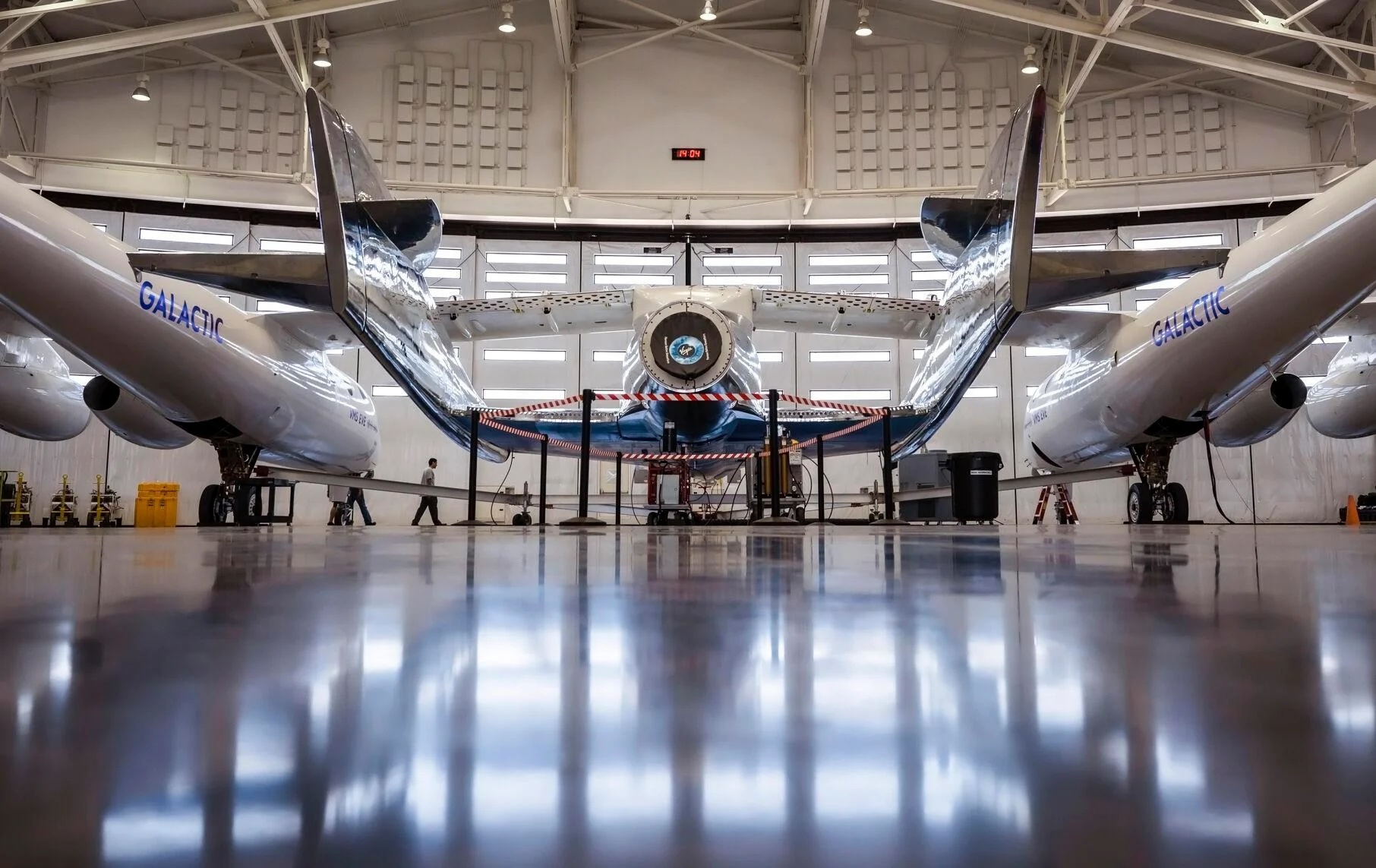
It’s almost time for VSS Unity to stand down. The spaceship’s last commercial flight out of Spaceport America is Saturday.
Then, it’ll be all hands on deck for spaceflight company Virgin Galactic to continue crafting and fine-tuning its new Delta Class spaceships. The company plans to begin Delta test flights in 2025 and launch commercial service in 2026.
Virgin Galactic CEO Michael Colglazier said in a statement the final flight for VSS Unity is “an exciting and historic turning point for the business as we dedicate our resources fully to the production of our next-generation Delta spaceships.”
The California-based company that operates in southern New Mexico anticipates the Delta ships could fly once or twice a week, compared to SpaceShipTwo-class VSS Unity’s once-a-month limit, a Virgin Galactic spokesperson told the Journal. And, the spokesperson said, Delta ships will require less regular maintenance and inspections compared to Unity.
VSS Unity’s final flight Saturday comes about eight years after the spaceship’s first flight in September 2016. This weekend’s launch is dubbed the “Galactic 07” mission.
It will be Virgin Galactic’s second flight this year and 12th total.
This is also the first flight following some mechanical issues earlier this year. In January, an alignment pin detached from the mothership VMS Eve after the release of VSS Unity.
The Federal Aviation Administration has since approved Virgin Galactic’s investigation report into the incident, and the company has taken corrective action to retain the mechanism of the pin, according to a May news release from Virgin Galactic.
VSS Unity will take off early Saturday morning, spending just a few minutes in space.
Virgin Galactic describes the spacecraft as a “suborbital science lab.”
On the ship, autonomous payloads — scientific instruments — from Purdue University and University of California will collect information for research related to propellant slosh in fuel tanks of maneuvering spacecraft and 3D printing, respectively, according to Virgin Galactic.
An Axiom Space research astronaut — Tuva Atasever — also will be on board to conduct human-tendered experiments. Three other private astronauts will also be on the flight. Their names will be released after the flight along with the two commanders of the Virgin Galactic crew.
Seats cost around $450,000 per passenger. Virgin Galactic had revenue of $7 million in 2023, more than triple what it was the year before, and revenue of $2 million in the first quarter of 2024.
In advance of Saturday’s launch, Virgin Galactic Spaceline President Mike Moses plans to give a media tour of Spaceport America and talk about the company’s future as it continues gathering test data for the Delta fleet.
Virgin Galactic opened a system integration facility in southern California in early May to test the operation of Delta ships, according to the company, and final assembly will happen at a Virgin Galactic facility in Arizona.
“With this approach, Virgin Galactic is moving from a prototype to a production model of developing spaceships — shaving years off the development timeline we saw with VSS Unity,” Moses said in a statement in May.
Quelle: Albuquerque Journal
----
Update: 9.06.2024
.
Virgin Galactic spaceplane takes tourists on flight
Virgin Galactic launches VSS Unity space plane on final suborbital spaceflight with crew of 6
It was Virgin Galactic's seventh commercial spaceflight mission and the company's second of 2024.
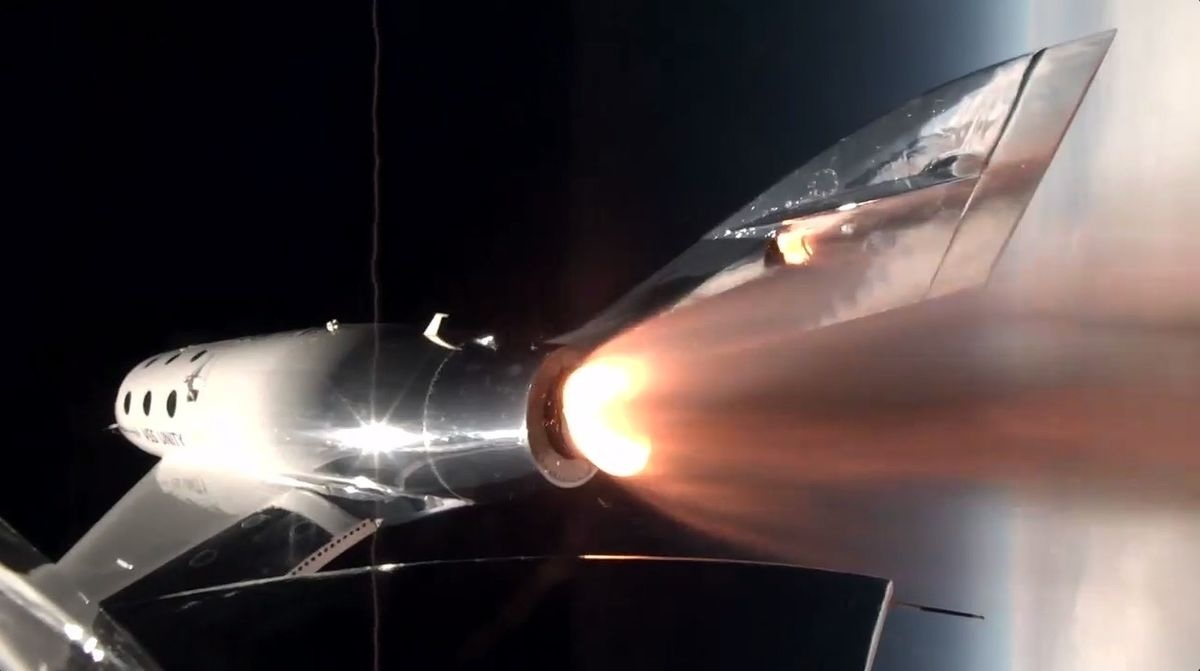
Virgin Galactic's VSS Unity space plane fires its rocket engine to launch two pilots and four passengers to suborbital space and back on the Galactic 07 mission on June 8, 2024. (Image credit: Virgin Galactic)
Virgin Galactic launched six people to suborbital space on Saturday (June 8), launching a Turkish astronaut and three space tourists on what was the final voyage of the VSS Unity space plane.
Unity, attached to the belly of its carrier plane Eve, took off from runway at Spaceport America in New Mexico at 10:31 a.m. EDT (1431 GMT) and carried to an altitude of 44,562 feet (13,582 meters) over the next hour, where it was dropped and ignited its rocket engine to carry two pilots and four passengers to space and back. The mission, called Galactic 07, reached an altitude of 54.4 miles (87.5 km) and marked the seventh commercial spaceflight by Virgin Galactic on Unity, which is being retired to make way for the company's new "Delta" class of spacecraft rolling out in 2026.
"I will need much more time to try and process what just happened," Tuva Atasever, the Turkish Space Agency astronaut on the flight, said in a post-flight press conference, adding that the view of Earth was indescribable. "It's not something you can describe with adjectives. It's an experiential thing … you just feel it in your gut."
Atasever's trip on on Galactic 07 was brokered by Axiom Space, a company that also flew a Turkish astronaut to the International Space Station with SpaceX on the private Ax-3 mission earlier this year. Atasever was a backup astronaut on the Ax-3 flight and oversaw three different experiments on Galactic 07.
Joining Atasever on the Virgin Galactic flight were VSS Unity commander Nicola Pecil and pilot Jameel Janjua. Virgin Galactic pilots Andy Edgell and C.J. Sturckow, a former NASA astronaut, flew the VMS Eve carrier plane.
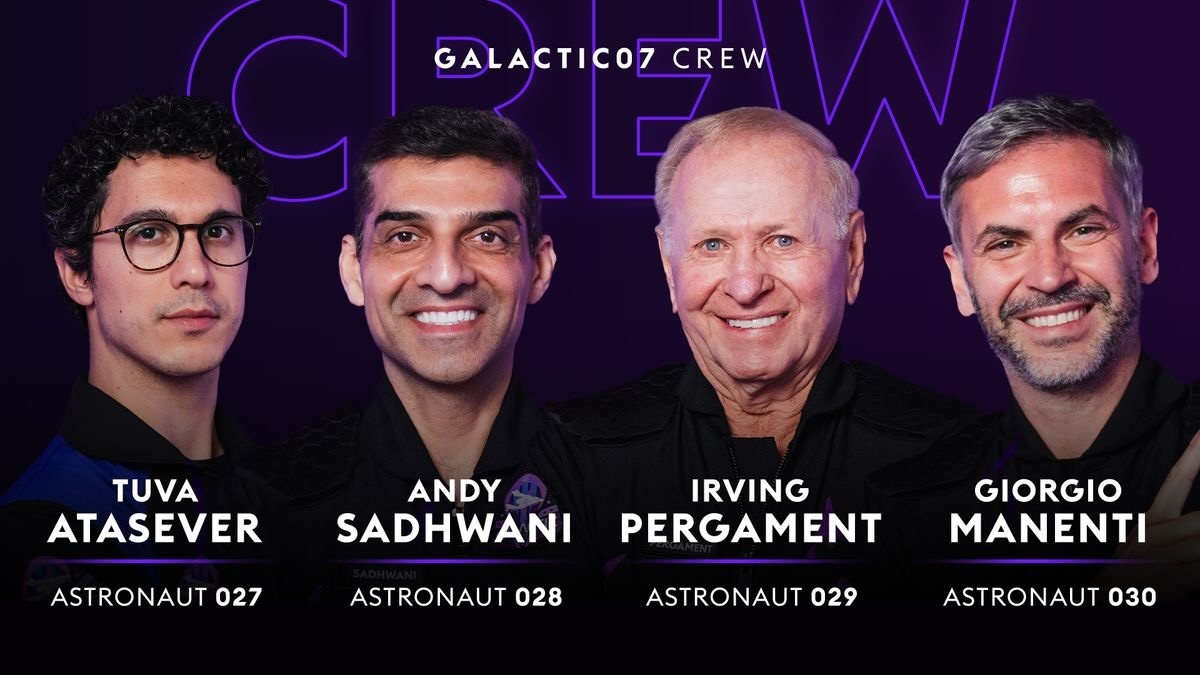
The four Galactic 07 astronauts on Virgin Galactic's VSS Unity. (Image credit: Virgin Galactic)
After Unity landed, Virgin Galactic unveiled the identities of the three paying passengers on the flight. They were:
- Anand "Andy" Harish Sadhwani of California;
- Irving Izchak Pergament if New York;
- Giorgi Manenti of Italy.
Sadhwani was born in Houston and been fascinated with space since he was 5 years old after a tour of NASA's Saturn V rocket. He has a bachelor's degree in mechanical engineering from Carnegie Mellon University and dual master's degrees in mechanical engineering and aeronautics and astronautics from Stanford. He works as a principal propulsion engineer at SpaceX. He wore the flags of the U.S. and India on his flight suit to honor both his home country and that of his parents, according to a mission profile.
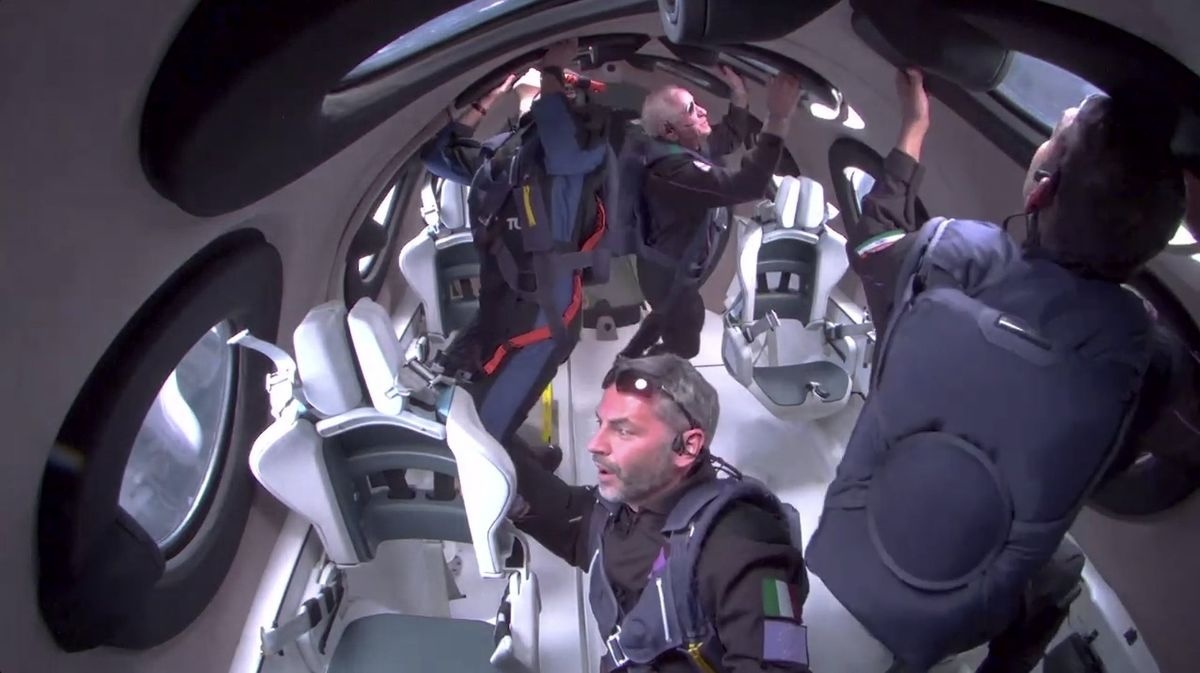
A view inside VSS Unity showing private astronauts floating and looking out the window on June 8, 2024. (Image credit: Virgin Galactic
Pergament is a New York-based real estate developer who grew up in Israel and has had a lifelog dream to reach space. "My life is a blend of my love for my family, my professional success and philanthropy, and a continual chase after the thrill of flight, now reaching for the stars," he said in a statement. He wore the flags of the U.S. and Israel on his flight suit.
Manenti is a London-based hotel and resort investment strategy advisor who prefers travel experiences over material possessions, according to a mission profile. Seeing Earth from space was a surreal experience, he said. "The feeling of being on the other side is tremendously exciting, this time looking down, admiring Earth in its [majestic] splendor," Manenti said in a statement. He wore the flags of Italy and the European Union on his flight suit.
The VSS Unity space plane landed back at Spaceport America at 11:41 a.m. EDT (1541 GMT), marking only its seventh commercial spaceflight for Virgin Galactic and 12th crewed spaceflight overall. In all, Virgin Galactic flew the space plane just 32 times, including non-space test flights.
But Unity will fly no more. Instead, Virgin Galactic is grounding Unity's SpaceShipTwo design in favor of its new "Delta Class" of spacecraft that are designed to fly more often.
"This vehicle was revolutionary," Virgin Galactic president Mike Moses said in the post-launch press conference. "We tested it, we flew it, we demonstrated and prove to the world that commercial human spaceflight is possible with private funding for private companies."
Unity's first fully-crewed suborbital spaceflight launched Virgin Galactic's founder, the billionaire Sir Richard Branson, and others in July 2021 on the Unity 22 mission, which followed three previous skeleton-crewed test flights. By 2023, the company was flying monthly flights for space tourists and research customers.
"So, seven commercial space flights, a single vehicle flying six times in six months last year, that's groundbreaking," Moses said. "The fact that we can take this vehicle back to back to back on a monthly basis is is really revolutionary."
The new Delta class of spacecraft will be able to fly at least twice a week, about eight times the rate of SpaceShipTwo, with Virgin Galactic planning to build at least two to start its new fleet.
"We're going to field in 2026 two spaceships, our mothership Eve, that's 750 astronauts a year going to space," Moses said of the new fleet's flight capacity. "That's more than have gotten to space in the 60 year history of spaceflight to date."
A pricey ride for thrills ... and science
Galactic 07 was Virgin Galactic's second mission of 2024. Its first flight of the year, Galactic 06, saw the first Ukrainian woman reach (suborbital) space.
Tickets for these flights are quite the investment, typically selling for $450,000. Passengers on Virgin Galactic's spaceplane experience a few minutes of weightlessness and get to see a view of Earth that very few get to see in a lifetime.
The suborbital spaceflight will also carried research payloads from Purdue University and University of California, Berkeley. According to the company's statement, Purdue's experiment focused on the "propellant slosh in fuel tanks of maneuvering spacecraft" while U.C. Berkeley tested out a new type of 3D printing in microgravity.
Since 2018, Virgin Galactic has flown payloads as part of NASA's Flight Opportunities program and most recently was selected to be a contracted flight provider for NASA for the next five years.
Axiom Space, a Houston-based private spaceflight company, has completed three crewed trips to date to the International Space Station, and has its fourth mission, (Ax-4), targeted for October at the earliest. The company has partnered with Virgin Galactic on several previous flights.
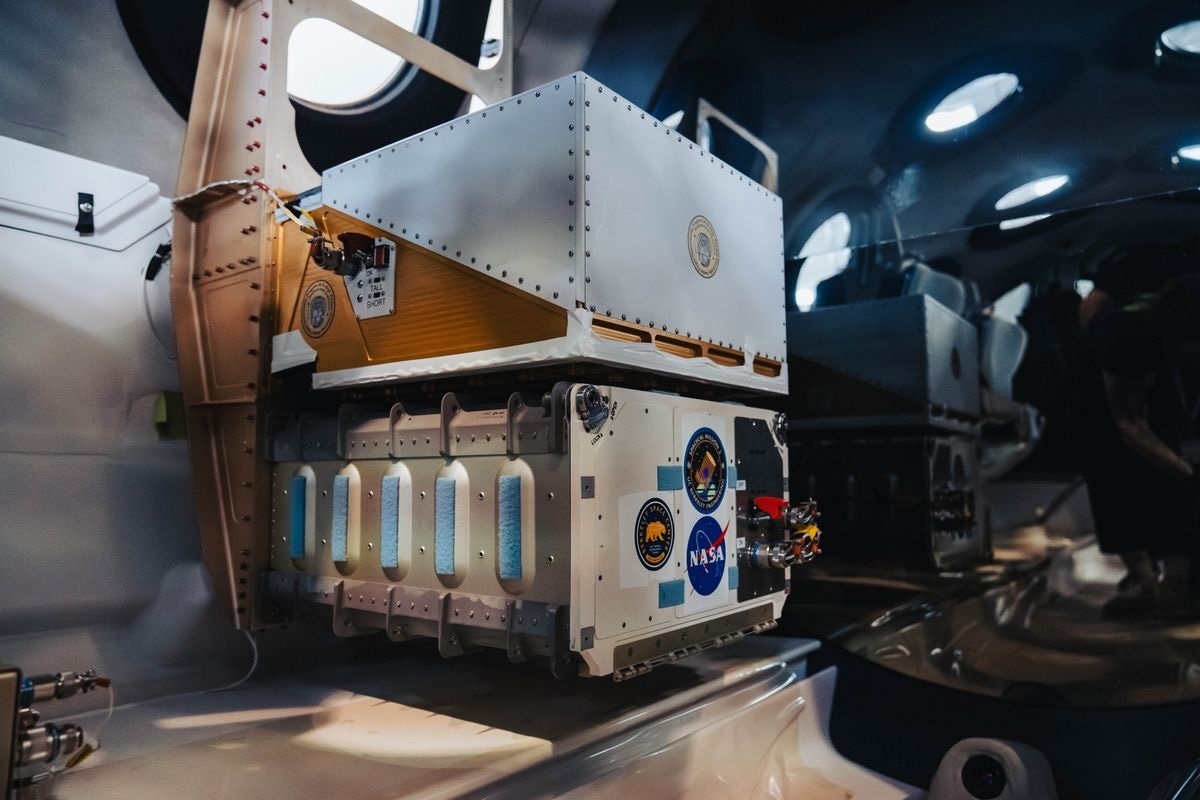
The NASA and UC Berkeley experiment payloads on Galactic 07. (Image credit: Virgin Galactic)
"Axiom Space's commitment to enabling access to space and providing opportunities for scientific discovery beyond Earth aligns closely with Virgin Galactic's mission," Tejpaul Bhatia, chief revenue officer of Axiom Space, said in Virgin Galactic's statement. "We are very excited about this upcoming Galactic 07 flight."
The Galactic 07 mission follows the previous in January where an alignment pin detached unexpectedly from VMS Eve after VSS Unity separated. Although no one was in any danger on the flight, the company notified the U.S. Federal Aviation Administration (FAA) so that both entities could conduct an investigation of the issue to prevent a repeat for future missions.
Corrective steps were taken by Virgin Galactic to ensure there will not be a repeat on Galactic 07.
Quelle: SC
